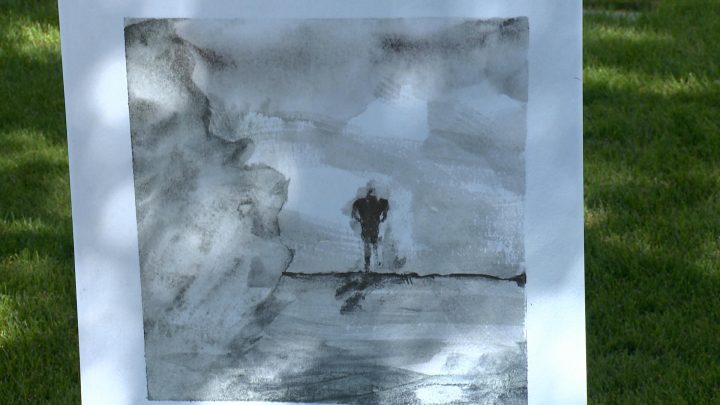Marilyn Irwin is the first to admit she isn’t an artist.

As she talks about the different pieces on display outside the Canadian Mental Health Association’s building in Saskatoon, she begins to tear up recounting the emotions she felt creating each one.
Her son, MacRae, died by suicide in 2018. Some of the art on display was created just days after his death.
“This is what I painted, and it was 23 days after my son died,” Irwin said as she shows Global News a painting of a man all in black walking away amid a white background.
To her, she said, the painting is “extremely powerful”.
“It says a lot, that he’s walking off into the distance,” she explained.

Get weekly health news
Another piece is meant to represent her son’s transforming into a spirit. Other paintings are self-portraits, focusing on her struggle to come to terms with her son’s passing.
She said she wanted this display to show the impact suicide has on the people like her that are left behind.
For the past three years Irwin has held demonstrations to remind people to keep the conversation around mental health open.
“It doesn’t mean that you have to jump in and rescue or save anyone,” she said.
“Just like ‘Hey, do you want to go for a coffee?’ or ‘How are you doing?’ or if a friend calls and doesn’t sound very well just check in with that friend, say ‘Hey, how are you doing?’”
She said she wants people to feel more comfortable discussing suicide and mental health problems.
Irwin said she was inspired to share her work by Tristen Durocher, a young man protesting in Regina calling for greater legislation to address suicide in Saskatchewan.
She said she met him while attending a gathering of mothers who had lost children to an overdose, also held outside the legislature this summer.
“I felt I had to open up my heart and have the strength that I want to remove the stigma, I want to show how suicide affects family members, and other people,” she said.
She said it’s important to talk about people’s mental health, especially right now amid the novel coronavirus pandemic.
The Canadian Mental Health Association (CMHA) said across Canada studies show thoughts of suicide have tripled since 2018, and this continues to grow in the pandemic.
It said the numbers are climbing in Saskatchewan.
“Our contacts with our clients have increased three times since before the pandemic, we have people coming to use who’ve never came to us before,” said Faith Bodnar, executive director with the CMHA’s Saskatoon branch.
Irwin said the province needs to do more on suicide prevention.
The CMHA is encouraging anyone struggling with suicidal thoughts to speak to friends or family, use online resources, or contact the association’s emergency hotline at (306)421-1871.
If you or someone you know is in crisis and needs help, resources are available. In case of an emergency, please call 911 for immediate help.
The Canadian Association for Suicide Prevention, Depression Hurts and Kids Help Phone 1-800-668-6868 all offer ways of getting help if you, or someone you know, may be suffering from mental health issues.








Comments
Want to discuss? Please read our Commenting Policy first.